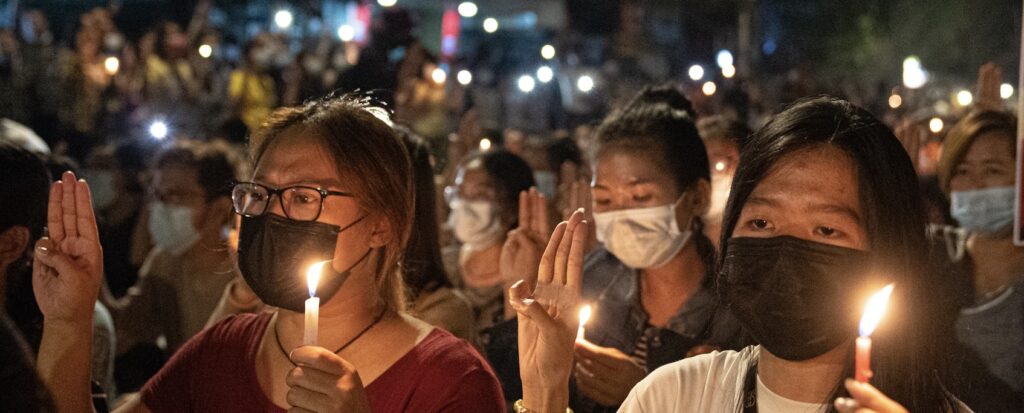
Stress, burnout, trauma. The mental health of those who fled Myanmar since the coup in February 2021 has been severely impacted. This has particularly affected human rights defenders and journalists forced into exile, often in neighbouring Thailand. With limited resources and only a small number of trained mental health and psychosocial support (MHPSS) professionals available in Thailand, many activists in exile do not have access to the mental health support that they need.
“For many human rights defenders, mental health can get overlooked in the face of more immediate physical dangers, but the invisible scars can last much longer, affecting their ability to lead a normal life,” explains Yucca Wai, the research director at Exile Hub, a nonprofit established in the aftermath of the coup in Myanmar.
On World Mental Health Day 2024, Exile Hub launched a mentoring programme with Open Briefing for counsellors and MHPSS providers in Thailand and Myanmar. The initiative is a significant step forward in equipping local mental health professionals with the skills needed to offer trauma-informed support to human rights defenders and journalists in exile. The goal is to significantly reduce the vulnerability to harm and re-traumatisation for these activists, ensuring that they get the expert care that they need.
The programme responds to critical gaps in both the community-based mental health system available to activists in exile and their families, and in the training for psychologists and counsellors in Myanmar and border areas in Thailand. “The mentoring program will support experts who, in turn, will help human rights defenders not only survive, but thrive,” explains Yucca.
Mentoring is particularly suited to addressing these challenges as it focuses on long-term personal and professional development. Open Briefing’s mentors will deliver a 12-month programme designed to reinforce the confidence and capacity of a group of counsellors and MHPSS providers in Thailand. They will provide guidance, support, and feedback through one-to-one and group support sessions to help participants expand and develop core MHPSS competencies. Informed by MHPSS professionals from both Exile Hub and Open Briefing, the programme is participatory, inclusive, cross-cultural, trauma-informed, aware of the ecosystem it is part of.
Our team is made up of psychologists and counsellors with extensive clinical experience in trauma-focused therapy and mental health. With specialist expertise in Eye Movement Desensitisation and Reprocessing Reprocessing (EMDR), crisis intervention, and culturally-sensitive care, they have worked in various settings around the world supporting human rights defenders and others affected by crises, war, and displacement.
To address gaps in the community-based mental health system, Open Briefing and Exile Hub will also help local counsellors and MHPSS providers to establish new group reflective practice sessions and peer support networks for human rights defenders and journalists living in exile in Thailand. The aim is to build sustainable foundations for continued community-based care for the activists and their families.
Addressing a Growing Need
“The fear of attacks or the threat of reprisals against colleagues or family members at home are significant sources of stress and anxiety for activists in exile,” explains Mohamed Lamaa, a counsellor at Open Briefing. That there are still activists facing danger at home while the relocated person lives in relative safety can lead to survivor’s guilt. Some may be living with grief and trauma, including post-traumatic stress disorder (PTSD), as a result of being targeted or losing people close to them.
Although many of these activists are aware of the decline in their mental health, some often downplay their condition. To help those who find it difficult to talk about their experiences, Exile Hub asked them to use visual expression to share their feelings and experiences.
The visuals that came back from the initiative are raw and powerful – a vivid reminder of the weight these activists carry in their fight for justice and freedom. By sharing these pieces, Exile Hub and Open Briefing aim to draw attention to the urgent mental health needs of these communities. They are not just art, but a call for action and awareness.
Mental health has been recognised as a key focus for Exile Hub in their work to support human rights defenders, as highlighted by their research Voices from Exile: The Safety Needs of Myanmar Women Journalists. An important milestone has been the partnership with Open Briefing, which has not only helped enhance the wellbeing practices within Exile Hub, but aims to create a safer and more supportive environment for Myanmar’s human rights defenders in exile.
Exile Hub continues to provide comprehensive support to human rights defenders, including fellowships, safe accommodation, grants, mental health counselling, workshops, and training. Their initiatives to raise awareness about mental health also include the Resilient Voices podcast and the It’s OK to not be OK Facebook page.
This collaboration between Exile Hub and Open Briefing is an important step in addressing critical gaps in the community-based mental health system available to activists living in exile. We look forward to deepening our collaboration and updating you on our progress over the coming year.
If you would be interested in learning more about the programme or offering resources and support, please contact the Exile Hub team on hello@exilehub.org or Camille Gallie, director of wellbeing and resilience at Open Briefing, on camille.gallie@openbriefing.org.



